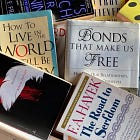Caitlin Clark on Practicing Stoic Virtues
Think how often you oppose others rather than build on your interdependence.
Perhaps Caitlin Clark has never read the Stoics. But at 22, she is living timeless Stoic virtues.
Not only is she arguably the greatest athlete of this generation, but she has had one of the most significant impacts on sports of any athlete. Games once played in front of 1500 are now being played in front of 15,000.
Last night, Clark set the NCAA women’s career scoring record. After the game, she made herself available for endless rounds of interviews in which, unlike many athletes, she didn’t merely talk in perfunctory cliches.
When asked about her achievements, she said, “I’m proud of the way I worked for this.” With that focus, she added, she doesn’t get up or down too much about each game.
In Meditations, Notebook 5, Entry 1, Marcus Aurelius writes: “I have work to do as a human being, and that’s why I’m getting up. Do I still resent it if I’m on my way to do the work for which I was born and for the sake of which I was brought into the world?”
Clark works harder than most of us, and she is proud that she does. Her talent may be outsized, but she would not be Caitlin Clark without her work ethic.
Last night, Caitlin also said, referring to her teammates, coaches, fans, and family, “If it wasn’t for them, I wouldn’t be Caitlin Clark.” She meant it.
The interconnectedness of all things is a common Stoic theme. In Notebook 6, entry 38, Aurelius writes, “You could almost say, since all things are intertwined with one another, that they’re in a loving relationship.” Clark is great because she is in touch with Reality.
Think how often you oppose others rather than build on your interdependence.
In his classic book on practice, Mastery: The Keys to Success and Long-Term Fulfillment, George Leonard observes how many of us have conditioned ourselves to think life is an “endless series of climatic moments.”
Writing in the early 1990s, Leonard observed television commercials, “The race is run and won; beautiful young people jump up and down in ecstasy as they reach for frosted cans of diet cola. Men are shown working at their jobs for all of a second and a half, then it’s Miller time.”
Quick fixes to life’s problems sum up the message in these commercials. “One epiphany follows another. One fantasy is crowded out by the next. Climax is piled upon climax. There’s no plateau,” observes Leonard.
Leonard wonders: Can many people learn to value the plateau? “If not,” he writes, “a large part of [our life] may well be spent in restless, distracted, ultimately self-destructive attempts to escape the plateau.”
Michelangelo famously said, “If people knew how hard I worked to get my mastery, it wouldn't seem so wonderful at all.”
Are we working towards mastery in our projects and endeavors, or are we waiting for a climax to arrive? Are we trusting too much in our good intentions and neglecting the mundane hard work that enables a meaningful life?
You will miss the learning lesson if you merely focus on Caitlin Clark's achievements. Clark and the Stoics have much to teach us about focusing on our process, not our arrival.
There is still time to join our study of Meditations at Mindset Shifts U. Tomorrow, we will begin Session 4: How to be a Truth Extremist.
A new paid subscriber shared this week: "I have enjoyed your essays very much. I am also joining because I have wanted to read Meditations for years. Hopefully, it's not too late to get started."
It is not late. Aurelius repeats his timeless themes in various ways, and you can begin at any point.
I appreciate your support for my work.




On my job site yesterday a young guy, working for the dry wall sub, so not my employee, was literally hiding from work. Pretending to work but actually wandering around doing nothing. I wanted to tell him ‘work hard, your day will go by twice as fast. You hiding out will make your day go soooo slowly. Work hard and your boss will give you better and better assignments. You will find something that interests you. You will get a satisfying career, make good money, and build a good life.’ He had wandered off before I could say anything. If I see him again, I will. But unless he asks me it will likely be pointless.
Thank you for this. So much of the world seems cultivation-averse. Collectively, we seem to be eager to skip the work if we think we can access the "achievement" another way. We settle for increasingly meaningless accolades and wonder why we seem to be chasing our tails. I'm grateful for a community that is immersed in a cultivation process.